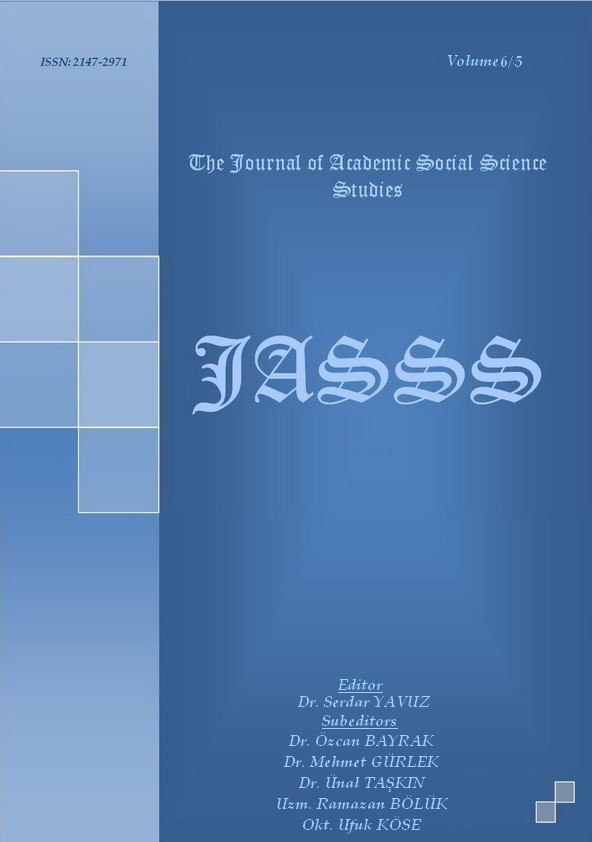DRAMA YÖNTEMİNİN ÖĞRENCİLERİN SOSYAL BİLGİLER BAŞARILARINA VE BİLİNÇLİ TÜKETİCİLİKLERİNE ETKİSİNİN ARAŞTIRILMASI
Author :
Abstract
Bu araştırmada İlköğretim 4. Sınıf Sosyal Bilgiler Programı’ndaki “Üretimden Tüketime” adlı ünitenin drama yöntemiyle işlenmesinin öğrencilerin başarısına ve bilinçli tüketicilik düzeyine etkisi araştırılmıştır. Araştırmanın çalışma grubunu 20’si deney 20’si kontrol grubu olmak üzere toplam 40 öğrenci oluşturmaktadır. Araştırmada nicel araştırma yöntemlerinden ön test-son test kontrol gruplu deneysel desen kullanılmıştır. Son testin uygulanmasının ardından öğrenmede kalıcılığın tespit edilebilmesi için kalıcılık testi uygulanmıştır. Araştırmanın veri toplama araçları “Üretimden Tüketime Ünitesi Başarı Testi” ve “Bilinçli Tüketicilik Düzeyi Ölçeği”dir. Başarı testiyle ilgili yapılan madde analizi sonucunda madde güçlüğü ve ayrıt ediciliği göz önünde bulundurulmuş, güvenirlik katsayısı ise .95 olarak bulunmuştur. 19 maddeden oluşan, güvenirlik katsayısı .77 olan ölçek ise üç alt boyuttan oluşmakta ve toplam varyansın %40.5’ini açıklamaktadır. Verilerin analizinde, işlem gruplarına bağlı olarak ilişkisiz ölçümler ve zamana bağlı olarak tekrarlı olan ilişkili ölçümler söz konusu olduğundan karışık ölçümler için iki faktörlü ANOVA; bilinçli tüketicilik düzeyi için t-testi kullanılmıştır. Araştırma sonucunda deney grubu ile kontrol gruplarının son test ve kalıcılık testi puanları arasında deney grubu lehine anlamlı bir farklılığın olduğu bulunmuştur. Bilinçli tüketicilik düzeyiyle ilgili olarak deney grubunun puan ortalamalarının kontrol grubuna göre yüksek olduğu fakat bu farkının anlamlı olmadığı görülmüştür. Elde edilen sonuçlara göre drama yönteminin sosyal bilgiler dersinde öğrencilerin başarılarına ve bilgilerin kalıcılığına katkı sağlayacak bir yöntem olduğu düşünülmektedir. Bilinçli tüketicilikle ilgili konuların öğretiminde de öğrencilerin aktif katılımını sağlayacak yöntemlerin kullanılabileceği önerilmektedir.
Keywords
Abstract
This study examined the effect of drama method on students’ achievement, conscious consumerism in Social Studies Instructional Programs of primary school fourth grade, “From Production to Consume” unit. The study group consisted of 40 fourth grade students including 20 test group and 20 control group. The research was designed in accordance with an experimental research model composed of pre-test and post-test with control and experimental groups. The achievement test was applied as retention test after process. As data collection tool “Scale for the Level of Conscious Consumerism” and “From Production to Consume Achievement Test” were used. Alpha reliability coefficient of the achievement test was .95; the scale was .77. In the analysis of data, two-way ANOVA was used to examine the main and interaction effects of test groups to pre-test, post-test and retention test; t-test was used to examine level of conscious consumerism. The result of the research showed that there is a significant difference between the total points of the post-test and retention-test of the test group and control group in favor of test group. The result of “Scale for the Level of Conscious Consumerism” showed that mean of the test group is higher than control group but it made no difference statistically. According to result of study drama method is useful for academic achieve and retention in social studies introduction. It is suggested that providing active participation methods should be used in conscious consumerism instruction.





